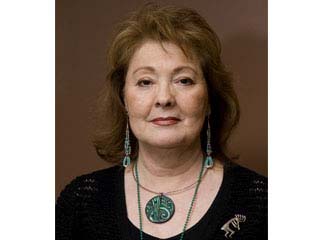By Valerie Taliman, Today correspondent
Story Published: Apr 29, 2010

North American Representative to the Permanent Forum Tonya
Gonnella Frichner, an attorney and founder of the American Indian Law
Alliance.
NEW YORK – A groundbreaking report examining the roots of Christian
domination over indigenous peoples and their lands was released this
week at the United Nations Permanent Forum on Indigenous Issues.
North American Representative to the Permanent Forum Tonya Gonnella
Frichner, an attorney and founder of the American Indian Law Alliance,
presented a preliminary study on the “Doctrine of Discovery” and its
historical impacts on indigenous peoples, with a focus on how it became
part of United States laws.
“The first thing indigenous peoples share is the experience of having
been invaded by those who treated us without compassion because they
considered us to be less than human,” said Frichner, a citizen of the
Onondaga Nation serving her first term on the 16-member UNPFII.
“Dehumanization leads to the second thing indigenous peoples share in
common: Being treated on the basis of the belief that those who invaded
our territories have a right of lordship or dominance over our existence
and, therefore, have the right to take, grant, and dispose of our lands,
territories, and resources without our permission or consent.”
Frichner said human rights violations faced by indigenous peoples can
all be traced to the Doctrine of Discovery and its interpretive
framework which has been used for five centuries to take Native lands.
It has also been cited in U.S. Supreme Court land claims cases decided
against Indian nations, including the 1955 ruling Tee Hit Ton Indians v.
United States, and the 2005 decision in City of Sherrill v. Oneida
Indian Nation of New York.
The Doctrine of Discovery was among Vatican mandates dating back to the
15th century, called papal bulls, that declared Christian monarchs had
the right to claim superior title over land and territories that they
“discovered.”
The claimed right of “dominion” over Native peoples was based on the
thinking that non-Christians were “heathens and uncivilized savages,”
with no, or limited rights, to land.
The Vatican’s Doctrine of Discovery was based on the premise that all
non-Christian land belonged to no one because no Christians were living
there and no Christian monarch or lord had yet claimed dominion. Once
Christian monarchies like Spain or France claimed the right of dominion,
that claim was transferred to political successors over centuries.
“Indian land rights have been characterized in U.S. law as nothing more
than a permissive right of occupancy or permission from the whites to
occupy their own Indian lands,” Frichner said.
There were theologians who did not agree that Christian discovery could
give dominion over and title to non-Christian lands. The issue was
debated at length in the early 1550s in Spain with no input from
indigenous peoples, she said.
It was a debate among Christian Europeans about whether the Indians of
the Americas were human.
“Clearly, (we) have joined the debate by declaring definitively that we
are human beings. However, for more than five centuries, the doctrines
of discovery and dehumanization have been institutionalized, and this is
the context of the work we are doing on the U.N. Declaration on the
Rights of Indigenous Peoples,” Frichner said.
The study focused on the history of the United States, and points out
that the Doctrine of Discovery had been officially incorporated into
U.S. Indian policies in the 1823 Supreme Court ruling Johnson v.
M’Intosh.
Supreme Court Chief Justice John Marshall identified the royal charters
of Great Britain pertaining to North America as the source of the
argument that “discovery gave title” to the government by whose
authority the “discovery” was made.
The royal charter issued to John Cabot in 1496 authorized Cabot and his
sons to seek out “isles, countries, and regions of the heathen and
infidel, which before this time have been unknown to all Christian
people.”
This and similar language were cited as the basis for the ruling in
Johnson v. M’Intosh that the United States had the ultimate dominion
over Indian peoples and lands.
Frichner said the report is a first step in investigating the global
scope of the Doctrine of Discovery as a key source of violations of
human rights of Native peoples.
A comprehensive study will provide the opportunity to understand that
all the struggles that indigenous peoples are engaged in are rooted in
“the claim by one people of a right of dominance over another.”
Frichner said the discriminatory legal framework that exists today is
directly tied to the Doctrine of Discovery which has resulted in the
dispossession and impoverishment of indigenous peoples and unlimited
resource extraction from their lands.
Kuriakose Bharanikulangara, observer for the Holy See, responded to
Frichner’s report by saying that the papal bulls that paved the way for
European expansion had been abrogated over centuries. He insisted the
Church had upheld the rights of indigenous peoples to their ancestral
lands, regardless of whether the inhabitants were Christian or not.
© 1998 - 2010 Indian Country Today. All Rights Reserved To subscribe or visit go to: http://www.indiancountry.com